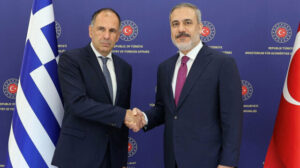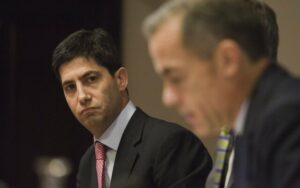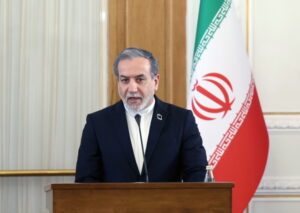“Ahead of the meeting that the foreign ministers of Greece and Türkiye will have tomorrow in Athens, the foreign ministers of Greece and Türkiye will hold in Athens at the start of the dialogue to find ways to discuss the dispute over the delimitation of the continental shelf, Giorgos Gerapetritis and Hakhan Fidan in interviews with Hurriyet and “TA NEA” respectively.
These interviews in a mild and dialectical way confirm the huge distance that separates the two sides, as despite the declared will to solve the problems, the well-known harsh positions on both Greek-Turkish and Cypriot issues are expressed from the Turkish side.
Fidan states that if there is no agreement in the dialogue then an appeal to international jurisdiction can be made with a “holistic approach“, a term recently used by Tajip Erdogan to define the package of “disputes” and sets as a condition the “removal of reservations and obstacles and the release of unfounded fears”. A statement essentially asking for the lifting of the reservations that Greece has placed on the jurisdiction of the International Court of the Hague on issues of sovereignty and national defense.
Fidan put forward the Turkish position for consideration in the form of a package of all “problems“, saying that “we have many interrelated problems that cannot be limited to the issue of the continental shelf and the EEZ alone. We believe that the time has come to address all these issues based on mutual respect and cooperation.”
Greek Foreign Minister Giorgos Gerapetritis, in response to similar questions from Hurriyet, says that “the national sovereignty of states cannot be the subject of discussion or international jurisdiction” and rejecting the discussion in the form of a package deal, he adds that “we can proceed in a coordinated and mutually constructive spirit to a substantive discussion on the delimitation of the continental shelf and the Exclusive Economic Zone (EEZ), which is the only dispute between Greece and Türkiye that can be brought before international jurisdiction.” In case no agreement can be reached within a reasonable period “the states concerned should have the possibility to appeal to the International Court of Justice in The Hague based on a compromise” the Foreign Minister stresses and admits that this is a difficult task.
The two ministers also respond to a question on the issue of the marine park in the Aegean Sea which has provoked strong reactions from Türkiye with Fidan accusing Greece of exploiting universal values such as the environment for political purposes and acting as if we don’t exist on the other side of the Aegean by proposing cooperation between the two countries. He even refers to the position expressed by the Turkish Foreign Ministry last spring when the marine park was announced, which had claimed that there are “islands of undefined sovereignty” even as far as the Cyclades in the region, saying that “we do not need to repeat our sensitivities on this issue.”
C. Gerapetritis responded that the Greek side has no intention to mislead in any way and that the two marine parks, in the Aegean and Ionian Seas, whose boundaries are determined by strict environmental criteria, do not affect the rights of other states.
Regarding the Cyprus issue, it is confirmed that Türkiye remains firmly on the hard line of the two-state solution with C. Fidan “freezing” any expectations from the planned convening of an informal “expanded” meeting under the UN (avoiding the term five-party meeting, as the Turkish side prefers the four-party meeting), noting that “it should now be understood that the page of the “reunification” of the island of Cyprus has been closed” and a solution based on the “realities of the island” should be sought. There are two separate peoples and two separate states on the island. They can live side by side in cooperation, as neighbors”. This solution, according to Fidan, will make possible the wealth, security, freedom, peace, and sovereignty of both Greek Cypriots and Turkish Cypriots.”
For Greece, it is clear that the UN processes and the expanded meeting should have a clear objective and goal of seeking a solution within the framework of the UN resolutions and as G.C. “we remain at the disposal of the UN Secretary-General to contribute to the dialogue for finding a just, viable and workable solution to the Cyprus problem within the framework of the UN Resolutions”.
“We remain at the disposal of the UN Secretary-General to contribute to the dialogue for finding a just, viable, and workable solution to the Cyprus problem within the framework of the UN Resolutions”.
The Turkish newspaper asked Gerapetritis the question “Against whom Greece will use the weapon systems with which the Greek Armed Forces are equipped”, an issue that often occupies the Turkish media. Describing the particularly dangerous international environment, as our region is caught between two wars, the Greek minister stressed that “we believe in dialogue and the peaceful resolution of disputes based on international law and respect for the sovereignty and territorial integrity of all states. At the same time, we cannot ignore modern security threats”, adding that “in these circumstances, we must ensure our country’s defense armor and strengthen its deterrent power. Our goal is to never have to use our defensive assets because if we do, our diplomacy will have failed.”
As this dialogue process is facing insurmountable obstacles due to Türkiye’s claims and demands, Athens attaches particular interest to the next day of a possible deadlock with G.M. Gerapetritis stressing in his interview with Hurriyet that “in any case, we need to maintain good cooperation and beneficial channels of communication, as “permanent tension, hostile rhetoric and the constant risk of a hot episode benefit no one. Above all, they do not benefit the two peoples”…
The two ministers will meet on Friday morning at 10:30 at the Foreign Ministry and will make statements at 12:30, with no questions from reporters scheduled. The Hakan Fidan will also go to the Turkish embassy where he is accustomed to meeting with fake muftis and representatives of the so-called “Supreme Consultative Committee of Turks of Western Thrace.”
Ask me anything
Explore related questions





